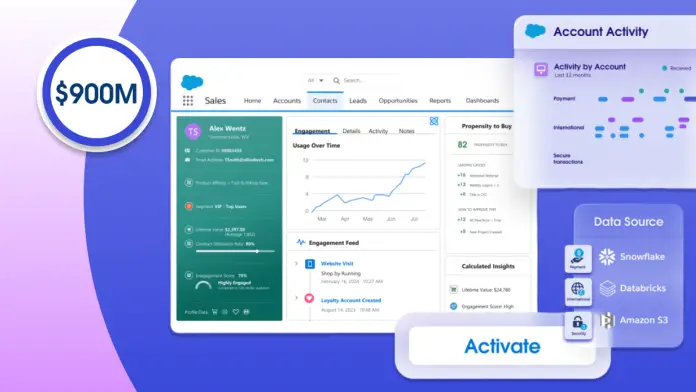In an era where informed decision-making hinges upon the ability to effectively harness data, Salesforce is stepping up with its Data Cloud and Agentforce offerings, bridging the gap between disparate data sources and enabling businesses to unlock valuable insights. This move comes as a response to the rapidly growing demand for a unified view of customer data, particularly for small business owners who are eager to enhance their customer engagement strategies.
Salesforce has positioned its Data Cloud as an essential tool for companies seeking to navigate the complexities of customer data in the age of artificial intelligence (AI). By uniting various data silos — from data lakes and warehouses to business applications — users can create a comprehensive understanding of their customers that fuels personalized experiences. This approach marks a fundamental shift in how organizations can employ AI-driven insights to enhance their operations.
"Data Cloud is the leading data activation layer on the market because of its ability to unify data and metadata from any location and harmonize it to power every agent action, automation, and insight," said Rahul Auradkar, EVP & GM of Unified Data Services & Einstein at Salesforce. He emphasizes the importance of a unified data strategy, particularly as small businesses strive to compete in an increasingly digital marketplace.
The capacity to aggregate and activate data is invaluable for small business owners. For instance, companies like Fisher & Paykel and Equinix have turned to Salesforce Data Cloud to enhance their customer experience and boost operational efficiency. Rudi Khoury, Chief Digital Officer at Fisher & Paykel, stated, "Data Cloud has been instrumental in allowing us to unlock trapped customer data and deliver a true Customer 360 view." This comprehensive visibility enables company representatives to build stronger relationships, solve customer issues more effectively, and foster brand loyalty.
Moreover, Data Cloud’s features are not limited to large enterprises. Its zero-copy integration capabilities allow small businesses to leverage existing investments without overhauling their IT infrastructure. The platform supports over 270 connectors with popular tools like Shopify and Google BigQuery, making integration accessible for smaller operations that may lack extensive tech resources.
However, as beneficial as these advancements are, small business owners should also contemplate potential challenges. Integrating new systems into existing processes can sometimes yield unanticipated hurdles, such as training staff or standardizing data practices. While Data Cloud is designed to ease the transition, the learning curve can still impact day-to-day operations in the short term.
For those looking to adopt AI capabilities, the need for robust data governance becomes crucial. Establishing trust in the data being utilized ensures that AI models perform effectively, ultimately improving decision-making and enhancing customer interactions. "Unified data is the strategic foundation that helps us better understand, serve, and predict our customers’ guests’ needs," noted Scott Strickland, Chief Commercial Officer at Wyndham Hotels & Resorts. By investing in a structured data strategy, small businesses can ensure that they’re not only compliant with regulations but also poised for growth.
Salesforce’s Data Cloud is increasingly being recognized in industry reports, including being named a Leader in the Gartner Magic Quadrant for Customer Data Platforms and the Forrester Wave for B2C Customer Data Platforms. These accolades underline the credibility of the platform in driving AI-powered transformations that directly benefit businesses and their customer engagement strategies.
As a testament to its impact, Katie Lewis, Director at Slalom, highlighted that their Data Cloud customer base grew by over 200% in 2024, particularly within retail and healthcare sectors. This trend suggests that small businesses across various industries are actively seeking ways to operationalize data collected from countless sources.
For small business owners, the shift from traditional data management practices to a more integrated, AI-focused approach can seem daunting. However, by leveraging the tools available through Salesforce’s Data Cloud, they stand to gain a competitive edge through enhanced customer understanding, innovative marketing strategies, and ultimately, increased sales.
Salesforce’s ongoing innovations reinforce its commitment to making data activation user-friendly and efficient, propelling small businesses forward in their data-driven journeys. The opportunities that lie in utilizing unified data are becoming increasingly evident in today’s digital landscape, making it a vital consideration for small business owners determined to thrive.
For more information, visit the original press release here.
Image Via Salesforce



